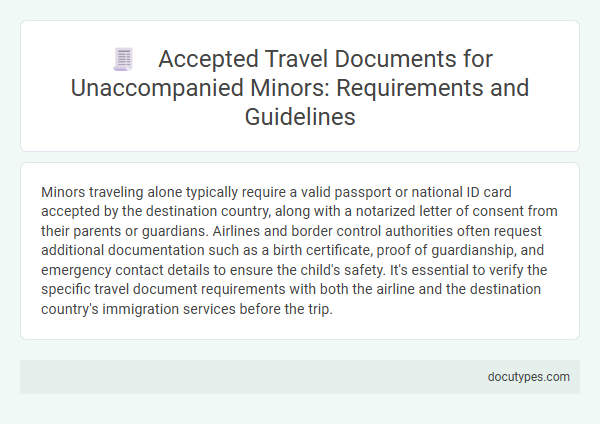Minors traveling alone typically require a valid passport or national ID card accepted by the destination country, along with a notarized letter of consent from their parents or guardians. Airlines and border control authorities often request additional documentation such as a birth certificate, proof of guardianship, and emergency contact details to ensure the child's safety. It's essential to verify the specific travel document requirements with both the airline and the destination country's immigration services before the trip.
Overview of Accepted Travel Documents for Unaccompanied Minors
Minors traveling alone must carry specific travel documents to ensure smooth transit and compliance with international and domestic regulations. Accepted documents vary by country but generally include identification and authorization forms designed for unaccompanied minors.
- Passport - An official government-issued passport is required for international travel and serves as primary identification.
- Parental Consent Letter - A notarized letter from parents or guardians granting permission for the child to travel alone is often mandatory.
- Unaccompanied Minor Form - Airlines may require a special form confirming the child's status and contact details of the responsible adult at the destination.
Passport Requirements for Unaccompanied Minors
Minors traveling alone must have valid travel documents, with a passport being the most universally accepted form of identification. Passport requirements for unaccompanied minors often include having the minor's details, a photograph, and sometimes parental consent documentation embedded or attached. Checking specific airline and country regulations ensures your minor's passport meets all necessary criteria for smooth travel.
Visa Guidelines for Minor Travelers
Minors traveling alone typically need specific travel documents, including a passport and sometimes a visa, depending on the destination country. Some countries have additional requirements, such as notarized parental consent or proof of guardianship.
Visa guidelines for minor travelers vary by country and often require an application accompanied by parental consent forms. Travelers should check the embassy or consulate website of the destination country for the latest visa requirements tailored for minors traveling independently.
Parental Consent Letter Specifications
Minors traveling alone must carry specific travel documents to ensure smooth passage through customs and security. Parental consent letters are often required and must meet strict specifications to be accepted.
- Clear Identification Details - The letter should include the minor's full name, date of birth, and passport number to clearly identify the child.
- Parental or Guardian Contact Information - Your contact details and relationship to the minor must be included for verification and emergencies.
- Notarization Requirement - Many authorities require the consent letter to be notarized to confirm its authenticity and prevent fraud.
Additional Identification: National ID and Birth Certificate
| Travel Document | Description | Applicability for Minors Traveling Alone |
|---|---|---|
| National ID | A government-issued identity card that verifies citizenship and personal details. | Accepted in some countries as valid identification for minors, especially within regional travel agreements. It provides an additional layer of verification alongside a passport. |
| Birth Certificate | Official record of birth, including full name, date of birth, and parentage. | Often required to prove the minor's identity and parental relationship. Used as supplementary ID when traveling alone, particularly where a passport is not mandatory or unavailable. |
Airline Requirements for Minor Documentation
Minors traveling alone must carry specific travel documents to comply with airline regulations. Airlines enforce strict documentation policies to ensure the safety and identification of unaccompanied minors.
- Government-issued Identification - Most airlines require a valid passport or national ID card to verify the minor's identity during travel.
- Parental Consent Form - A notarized consent form from parents or guardians is often mandatory to authorize the minor's solo travel.
- Unaccompanied Minor Service Forms - Airlines provide specific forms detailing the minor's travel arrangements and emergency contacts for in-flight supervision.
Checking individual airline requirements before travel prevents delays and ensures a smooth boarding process for unaccompanied minors.
Entry and Exit Regulations by Destination Country
Minors traveling alone must present specific travel documents depending on the destination country's entry and exit regulations. These documents often include passports, visas, and sometimes notarized consent forms from parents or legal guardians.
Countries such as the United States, Canada, and Australia require unaccompanied minors to carry additional authorization to ensure safe travel and compliance with immigration policies. Airlines and border control officials closely enforce these regulations to prevent issues during arrival and departure.
Special Considerations for Dual Citizens and Refugee Minors
Minors traveling alone must carry specific travel documents to ensure smooth passage through immigration and security checks. These documents vary depending on citizenship status and residency.
Dual citizen minors need to present valid passports from each country of citizenship, alongside any required visas or parental consent forms. Refugee minors must carry travel documents such as a Refugee Travel Document or a Convention Travel Document issued by their host country. Airlines and border authorities may request additional documentation to verify guardianship and travel authorization.
Document Authentication and Notarization Procedures
Minors traveling alone typically require a valid passport or a government-issued ID as primary travel documents. Document authentication involves verifying the authenticity of identification papers through official channels such as embassies or consulates. Notarization procedures often require a parent or guardian's consent letter to be notarized, ensuring legal permission for the minor's travel.
Which Travel Documents Are Accepted for Minors Traveling Alone? Infographic

